- Home
- David Brin
Infinity's Shore u-5 Page 11
Infinity's Shore u-5 Read online
Page 11
That time came to this world long ago. This place should have vanished along with all the great cities, back when Jijo was lain fallow. By some oversight, it was missed by the great destroyer machines and living acid lakes.
Now desperate fugitives use the ancient causeway to evade a hostile sky, suddenly filled with ships.
While still vague on details, Emerson knows he has been fleeing starships for a very long time, along with Gillian, Hannes, Tsh’t, and the crew of Streaker.
Faces flicker, accompanying each name as recall agony makes him grunt and squeeze his eyelids. Faces Emerson pines for … and desperately hopes never to see again. He knows he must have been sacrificed somehow, to help the others get away.
Did the plan succeed? Did Streaker escape ahead of those awful dreadnoughts? Or has he suffered all of this for nothing?
His companions breathe heavily and perspire. They seem taxed by the stale air, but to Emerson it is just another kind of atmosphere. He has inhaled many types over the years. At least this stuff nourishes the lungs …
… unlike the wind back on the green-green world, where a balmy day could kill you if your helmet failed.…
And his helmet did fail, he now recalls, at the worst possible time, while trying to cross a mat of sucking demiveg, running frantically toward—
Sara and Prity gasp aloud, snapping his mental thread, making him look up to see what changed.
At a brisk pace the wagon enters a sudden widening of the tunnel, like the bulge where a snake digests its meal. Dimpled walls recede amid deep shadows, where dozens of large objects dimly lurk — tubelike vehicles, corroded by time. Some have been crushed by rock falls. Piles of stony debris block other exits from the underground vault.
Emerson lifts a hand to stroke a filmy creature riding his forehead, as lightly as a scarf or veil. The rewq trembles at his touch, swarming down to lay its filmy, translucent membrane over his eyes. Some colors dim, while others intensify. The ancient transit cars seem to shimmer like specters, as if he is looking at them not through space, but time. It is almost possible to imagine them in motion, filled with vital energies, hurtling through a network that once girdled a living, global civilization.
The horsewomen sitting on the foremost bench clutch their reins and peer straight ahead, enclosed by a nimbus of tension made visible by the rewq. The film shows Emerson their edgy, superstitious awe. To them, this is no harmless crypt for dusty relics, but a macabre place where phantoms prowl. Ghosts from an age of gods.
The creature on his brow intrigues Emerson. How does the little parasite translate emotions — even between beings as different as human and traeki — and all without words? Anyone who brought such a treasure to Earth would be richly rewarded.
To his right, he observes Sara comforting her chimpanzee aide, holding Prity in her arms. The little ape cringes from the dark, echoless cavern, but the rewq’s overlaid colors betray a fringe of deceit in Prity’s distress. It is partly an act! A way to distract her mistress, diverting Sara from her own claustrophobic fears.
Emerson smiles knowingly. The hues surrounding Sara reveal what the unaided eye already knows — that the young woman thrives on being needed.
“It’s all right, Prity,” she soothes. “Shh. It’ll be all right.”
The phrases are so simple, so familiar that Emerson understands them. He used to hear the same words while thrashing in his delirium, during those murky days after the crash, when Sara’s tender care helped pull him back from that pit of dark fire.
The vast chamber stretches on, with just the glowing stripe to keep them from drifting off course. Emerson glances back to see young Jomah, seated on the last bench with his cap a twisted mass between his hands, while his uncle Kurt tries to explain something in hushed tones, motioning at the distant ceiling and walls — perhaps speculating what held them up … or what explosive force it would take to bring them crashing down. Nearby, with fastened hands and feet, the rebel, Dedinger, projects pure hatred of this place.
Emerson snorts annoyance with his companions. What a gloomy bunch! He has been in spots infinitely more disturbing than this harmless tomb … some of them he can even remember! If there is one sure truth he can recall from his former life, it is that a cheerful journey goes much faster, whether you are in deep space or the threshold of hell.
From a bag at his feet, he pulls out the midget dulcimer Ariana Foo had given him back at the Biblos Archive, that ornate hall of endless corridors stacked high with paper books. Not bothering with the hammers, he lays the instrument on his lap and plucks a few strings. Twanging notes jar the others from their anxious mutterings to look his way.
Though Emerson’s ravaged brain lacks speech, he has learned ways to nudge and cajole. Music comes from a different place than speech, as does song.
Free association sifts the shadowy files of memory. Early drawers and closets, undammed by the traumas of later life. From some cache he finds a tune about travel down another narrow road. One with a prospect of hope at the end of the line.
It spills forth without volition, as a whole, flowing to a voice that’s unpracticed, but strong.
“I’ve got a mule, her name is Sal,
Fifteen miles down the Erie Canal.
She’s a good old worker and a good
old pal,
Fifteen miles down the Erie Canal.
We’ve hauled some cargo in our day,
Filled with lumber, coal, and hay,
And we know every inch of the way,
From Albany to Buffalo-o-o.…”
Amid the shadows, they are not easily coaxed from their worries. He too can feel the weight of rock above, and so many years. But Emerson refuses to be oppressed. He sings louder, and soon Jomah’s voice joins the refrain, followed tentatively by Sara’s. The horses’ ears flick. They nicker, speeding to a canter.
The subterranean switching yard narrows again, walls converging with a rush. Ahead, the glowing line plunges into a resuming tunnel.
Emerson’s voice briefly falters as a flicker of memory intrudes. Suddenly he can recall another abrupt plunge … diving through a portal that opened into jet vacuum blankness … then falling as the universe converged on him from all sides to squeeze.…
And something else.
A row of pale blue eyes.
Old Ones …
But the song has a life of its own. Its momentum pours unstoppably from some cheerful corner of his mind, overcoming those brief, awful images, making him call out the next verse with a vigor of hoarse, throaty defiance.
“Low bridge, everybody down!
Low bridge! ’cause we’re comin’
to a town.
And you’ll always know your neighbor,
Always know your pal,
If you ever navigate along the Erie Canal.”
His companions lean away from the rushing walls. Their shoulders press together as the hole sweeps up to swallow them again.
PART THREE
ONCE A LENGTHY EPISODE of colonization finally comes to an end, subduction recycling is among the more commonly used methods for clearing waste products on a life world. Where natural cycles of plate tectonics provide a powerful indrawing force, the planet’s own hot convection processes can melt and remix elements that had been fashioned into tools and civilized implements. Materials that might otherwise prove poisonous or intrusive to new-rising species are thus removed from the fallow environment, as a world eases into the necessary dormant phase.
What happens to these refined materials, after they have been drawn in, depends on mantle processes peculiar to each planet. Certain convection systems turn the molten substance into high-purity ores. Some become lubricated by water seeps, stimulating the release of great liquid magma spills. Yet another result can be sudden expulsions of volcanic dust, which briefly coat the planet and can later be traced in the refractory-metal enrichment of thin sedimentary layers.
Each of these outcomes can result in perturbations of the loc
al biosphere, and occasional episodes of extinction. However, the resulting enrichment fecundity usually proves beneficial enough to compensate, encouraging development of new presapient species.…
from A Galactographic Tutorial for Ignorant Wolfling Terrans, a special publication of the Library Institute of the Five Galaxies, year 42 EC, in partial satisfaction of the debt obligation of 35 EC
Streakers
Hannes
SUESSI FELT NOSTALGIC ABOUT BEING HUMAN. NOW and then, he even wished he were still a man.
Not that he was ungrateful for the boon the Old Ones had granted him, in that strange place called the Fractal System, where aloof beings transformed his aged, failing body into something more durable. Without their gift, he would be stone dead — as cold as the giant corpses surrounding him in this dark ossuary of ships.
The ancient vessels seemed peaceful, in dignified repose. It was tempting to contemplate resting, letting eons pass without further care or strife.
But Suessi was much too busy to spare time for being dead.
“Hannes,” a voice crackled directly to his auditory nerve.
“Two minutes, Hannes. then I think-k we’ll be ready to resume cut-t-ting.”
Shafts of brilliant illumination speared through the watery blackness, casting bright ovals toward one curved hull segment of the Terran starship Streaker. Distorted silhouettes crisscrossed the spotlight beams — the long undulating shadows of workers clad in pressurized armor, their movements slow, cautious.
This was a more dangerous realm than hard vacuum.
Suessi did not have a larynx anymore, or lungs to blow air past one if he had. Yet he retained a voice.
“Standing by, Karkaett,” he transmitted, then listened as his words were rendered into groaning saser pulses. “Please keep the alignment steady. Don’t overshoot.”
One shadow among many turned toward him. Though cased in hard sheathing, the dolphin’s tail performed a twist turn with clear body-language meaning.
Trust me … do you have any choice?
Suessi laughed — a shuddering of his titanium rib cage that replaced the old, ape-style method of syncopated gasps. It wasn’t as satisfying, but then, the Old Ones did not seem to have much use for laughter.
Karkaett guided his team through final preparations while Suessi monitored. Unlike some others in Streaker’s crew, the engineering staff had grown more seasoned and confident with each passing year. In time, they might no longer need the encouragement — the supervising crutch — of a member of the patron race. When that day came, Hannes would be content to die.
I’ve seen too much. Lost too many friends. Someday, we’ll be captured by one of the eatee factions pursuing us. Or else, we’ll finally get a chance to turn ourselves in to some great Institute, only to learn Earth was lost while we fled helter-skelter across the universe. Either way, I don’t want to be around to see it.
The Old Ones can keep their Ifni-cursed immortality.
Suessi admired the way his well-trained team worked, setting up a specially designed cutting machine with cautious deliberation. His audio pickups tracked low mutterings—keeneenk chants, designed to help cetacean minds concentrate on explicit thoughts and tasks that their ancestral brains were never meant to take on. Engineering thoughts — the kind that some dolphin philosophers called the most painful price of uplift.
These surroundings did not help — a mountainous graveyard of long-dead starcraft, a ghostly clutter, buried in the kind of ocean chasm that dolphins traditionally associated with their most cryptic cults and mysteries. The dense water seemed to amplify each rattle of a tool. Every whir of a harness arm resonated queerly in the dense liquid environment.
Anglic might be the language of engineers, but dolphins preferred Trinary for punctuation — for moments of resolution and action. Karkaett’s voice conveyed confidence in a burst phrase of cetacean haiku.
Through total darkness
Where the cycloid’s gyre comes never …
Behold — decisiveness!
The cutting tool lashed out, playing harsh fire toward the vessel that was their home and refuge … that had carried them through terrors unimaginable. Streaker’s hull — purchased by the Terragens Council from a third-hand ship dealer and converted for survey work — had been the pride of impoverished Earthclan, the first craft to set forth with a dolphin captain and mostly cetacean crew, on a mission to check the veracity of the billion-year-old Great Library of the Civilization of the Five Galaxies.
Now the captain was gone, along with a quarter of the crew. Their mission had turned into a calamity for both Earthclan and the Five Galaxies. As for Streaker’s hull — once so shiny, despite her age — it now lay coated by a mantle of material so black the abyssal waters seemed clear by comparison. A substance that drank photons and weighed the ship down.
Oh, the things we’ve put you through, dear thing.
This was but the latest trial for their poor ship.
Once, bizarre fields stroked her in a galactic tide pool called the Shallow Cluster, where they “struck it rich” by happening upon a vast derelict fleet containing mysteries untouched for a thousand eons. In other words, where everything first started going wrong.
• • •
Savage beams rocked her at the Morgran nexus point, where a deadly surprise ambush barely failed to snare Streaker and her unsuspecting crew.
Making repairs on poisonous Kithrup, they ducked out almost too late, escaping mobs of bickering warships only by disguising Streaker inside a hollowed-out Thennanin cruiser, making it to a transfer point, though at the cost of abandoning many friends.
Oakka, the green world, seemed an ideal goal after that — a sector headquarters for the Institute of Navigation. Who was better qualified to take over custody of their data? As Gillian Baskin explained at the time, it was their duty as Galactic citizens to turn the problem over to the great institutes — those august agencies whose impartial lords might take the awful burden away from Streaker’s tired crew. It seemed logical enough — and nearly spelled their doom. Betrayal by agents of that “neutral” agency showed how far civilization had fallen in turmoil. Gillian’s hunch saved the Earthling company — that and a daring cross-country raid by Emerson D’Anite, taking the conspirators’ base from behind.
Again, Streaker emerged chastened and worse for wear.
There was refuge for a while in the Fractal System, that vast maze where ancient beings gave them shelter. But eventually that only led to more betrayal, more lost friends, and a flight taking them ever farther from home.
Finally, when further escape seemed impossible, Gillian found a clue in the Library unit they had captured on Kithrup. A syndrome called the “Sooner’s Path.” Following that hint, she plotted a dangerous road that might lead to safety, though it meant passing through the licking flames of a giant star, bigger than Earth’s orbit, whose soot coated Streaker in layers almost too heavy to lift.
But she made it to Jijo.
This world looked lovely from orbit. Too bad we had only that one glimpse, before plunging to an abyssal graveyard of ships.
Under sonar guidance by dolphin technicians, their improvised cutter attacked Streaker’s hull. Water boiled into steam so violently that booming echoes filled this cave within a metal mountain. There were dangers to releasing so much energy in a confined space. Separated gases might recombine explosively. Or it could make their sanctuary detectable from space. Some suggested the risk was too great … that it would be better to abandon Streaker and instead try reactivating one of the ancient hulks surrounding them as a replacement.
There were teams investigating that possibility right now. But Gillian and Tsh’t decided to try this instead, asking Suessi’s crew to pull off one more resurrection.
The choice gladdened Hannes. He had poured too much into Streaker to give up now. There may be more of me in her battered shell than remains in this cyborg body.
Averting his sensors from the cutter’s ac
tinic glow, he mused on the mound of cast-off ships surrounding this makeshift cavern. They seemed to speak to him, if only in his imagination.
We, too, have stories, they said. Each of us was launched with pride, flown with hope, rebuilt many times with skill, venerated by those we protected from the sleeting desolation of space, long before your own race began dreaming of the stars.
Suessi smiled. All that might have impressed him once — the idea of vessels millions of years old. But now he knew a truth about these ancient hulks.
You want old? he thought. I’ve seen old.
I’ve seen ships that make most stars seem young.
The cutter produced immense quantities of bubbles. It screeched, firing ionized bolts against the black layer, just centimeters away. But when they turned it off at list, the results of all that eager destructive force were disappointing.
“That-t’s all we removed?” Karkaett asked, incredulously, staring at a small patch of eroded carbon. “It’ll take years to cut it all away, at-t this rate!”
The engineer’s mate, Chuchki, so bulky she nearly burst from her exo-suit, commented in awed Trinary.
Mysteries cluster
Frantic, in Ifni’s shadow—
Where did the energy go!
Suessi wished he still had a head to shake, or shoulders to shrug. He made do instead by emitting a warbling sigh into the black water, like a beached pilot whale.
Not by Ifni’s name,
But her creative employer—
I wish to God I knew.
Gillian
IT ISN’T EASY FOR A HUMAN BEING TO PRETEND she’s an alien.
Especially if the alien is a Thennanin.
Shrouds of deceitful color surrounded Gillian, putting ersatz flesh around the lie, providing her with an appearance of leathery skin and a squat bipedal stance. On her head, a simulated crest rippled and flexed each time she nodded. Anyone standing more than two meters away would see a sturdy male warrior with armored derma and medallions from a hundred stellar campaigns — not a slim blond woman with fatigue-lined eyes, a physician forced by circumstances to command a little ship at war.

 The Practice Effect
The Practice Effect Infinity's Shore
Infinity's Shore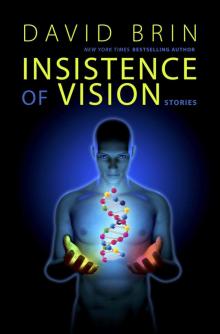 Insistence of Vision
Insistence of Vision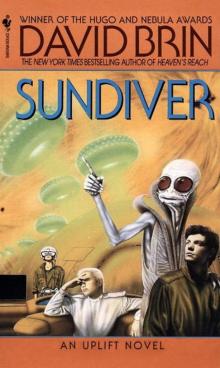 Sundiver
Sundiver Brightness Reef
Brightness Reef Existence
Existence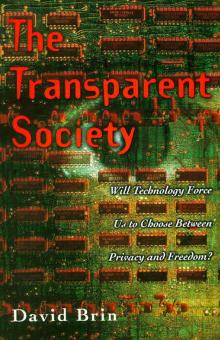 The Transparent Society
The Transparent Society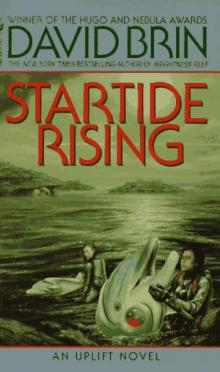 Startide Rising
Startide Rising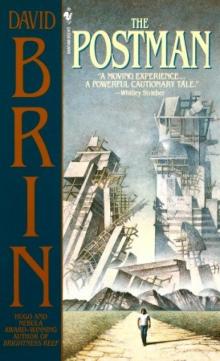 The Postman
The Postman The Uplift War
The Uplift War The Loom of Thessaly
The Loom of Thessaly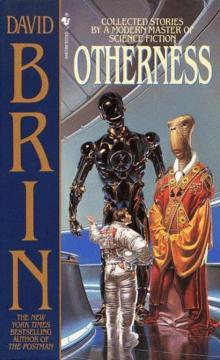 Otherness
Otherness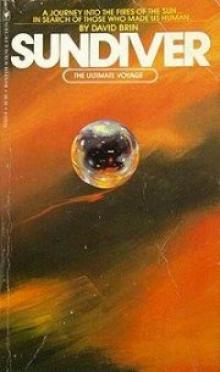 Sundiver u-1
Sundiver u-1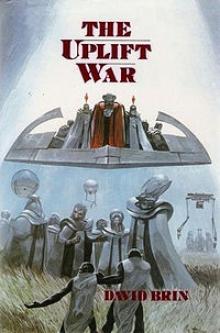 The Uplift War u-3
The Uplift War u-3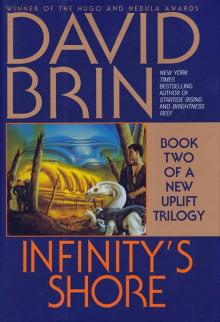 Infinity's Shore u-5
Infinity's Shore u-5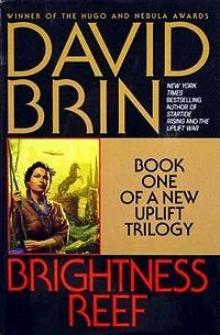 Brightness Reef u-4
Brightness Reef u-4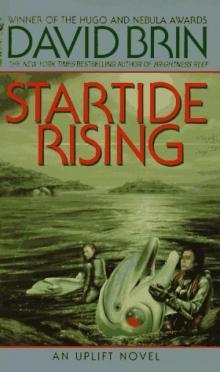 Uplift 2 - Startide Rising
Uplift 2 - Startide Rising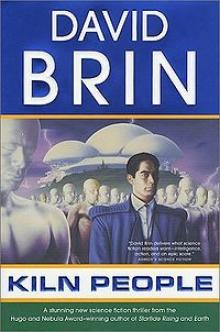 Kiln People
Kiln People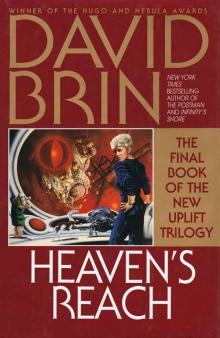 Heaven's Reach u-6
Heaven's Reach u-6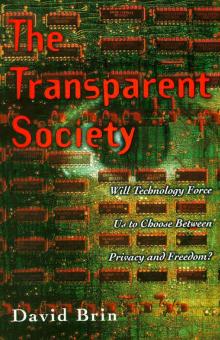 The Transparent Society: Will Technology Force Us to Choose Between Privacy and Freedom?
The Transparent Society: Will Technology Force Us to Choose Between Privacy and Freedom?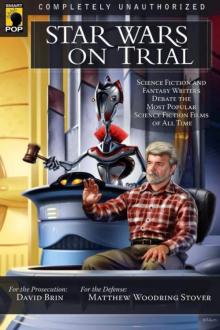 Star Wars on Trial
Star Wars on Trial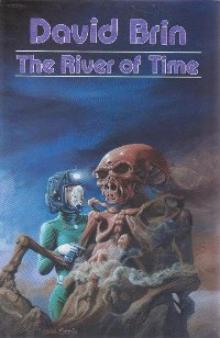 Lungfish
Lungfish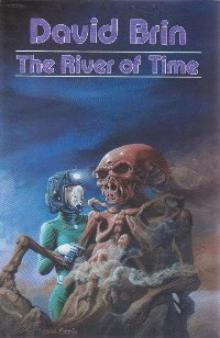 Tank Farm Dynamo
Tank Farm Dynamo Just a Hint
Just a Hint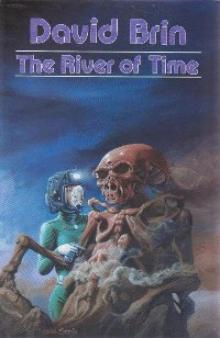 A Stage of Memory
A Stage of Memory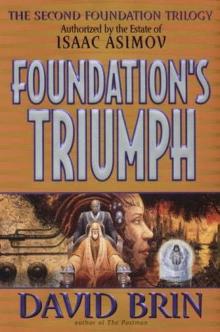 Foundation’s Triumph sf-3
Foundation’s Triumph sf-3 Thor Meets Captain America
Thor Meets Captain America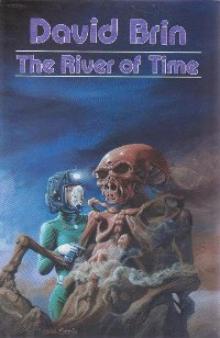 Senses Three and Six
Senses Three and Six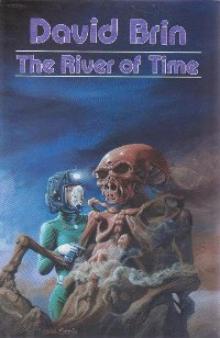 The River of Time
The River of Time Chasing Shadows: Visions of Our Coming Transparent World
Chasing Shadows: Visions of Our Coming Transparent World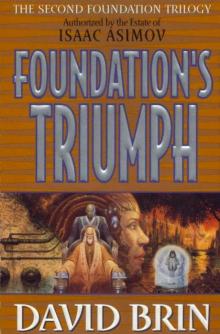 Foundation's Triumph
Foundation's Triumph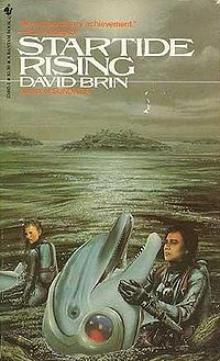 Startide Rising u-2
Startide Rising u-2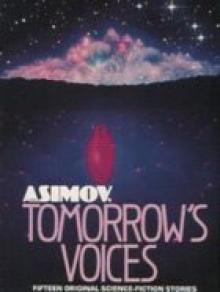 The Fourth Vocation of George Gustaf
The Fourth Vocation of George Gustaf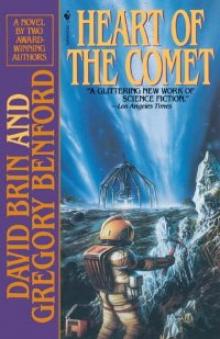 The Heart of the Comet
The Heart of the Comet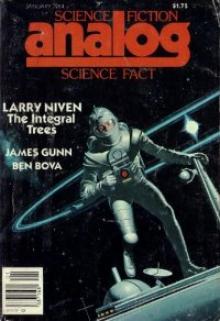 The Crystal Spheres
The Crystal Spheres